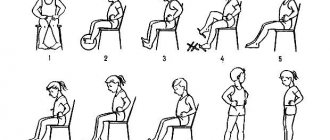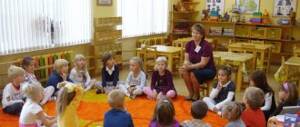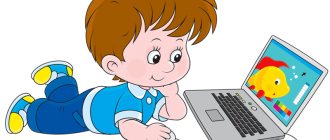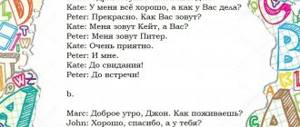Age characteristics of fourth-graders presentation for a lesson (4th grade) on the topic
Slide 1
“The best way to make children good is to make them happy.” Oscar Wilde
Slide 2
Age characteristics of children 9 – 1 1 years old Increased growth Increased muscle volume Replacement of baby teeth By the age of 10-12 years, the full development of the cellular structures of the brain ends. Memory improves, intelligence increases. The direction of personality development is decided.
Slide 3
Age characteristics of children 9 – 1 1 years old Physical 1. A child of this age is very active. Loves adventures, physical exercise, games. 2. May neglect his appearance. We suggest: 1. Use walks, trips, camps 2. Teach the child personal hygiene, care for his clothes, room, and teach him to be punctual.
Slide 4
Age characteristics of children 9 – 1 1 years old Intellectual 1. Likes to explore everything that is unfamiliar. 2. Understands the laws of sequence and consequences. Has a good historical and chronological sense of time, space, distance. 3. Thinks well and his understanding of the abstract is growing. 4. I like making collections. Collects anything. For him, the main thing is not quality, but quantity. 5. “The Golden Age of Memory”
Slide 5
Age characteristics of children 9 – 1 1 years old Intellectual We offer: 1. Learning through research. Ask your “why?” 2. Go beyond superficial facts. 3. Ask questions that the child can find answers to on their own
Slide 6
Age characteristics of children 9 – 1 1 years old Emotional. 1. Expresses his feelings harshly. First he speaks, and then he thinks. 2. Freely expresses his emotions. Emotionally quickly gets involved in disputes. 3. A sense of humor begins to develop. Wants to tell funny stories. 4. Hidden fears. He would like to appear fearless.
Slide 7
Age characteristics of children 9 – 1 1 years old Emotional. We suggest: 1. Teach self-control: when to be serious and calm, and when to be cheerful. 2. Teach tolerance. Consider all the facts before making a decision. Learn to respect the rights and feelings of other people. 3. Teach to laugh at yourself. Do not make jokes that will offend other people.
Slide 8
Age characteristics of children 9 – 1 1 years old Social 1. The child begins to be independent. 2. Adapts to society outside the family circle. 3. Looks for a group of peers of the same sex, because for girls, boys are “too loud and boisterous,” and for boys, girls are “too stupid.”
Slide 9
Age characteristics of children 9 – 1 1 years old Social 1. Teach friendliness. Encourage your child not to take the “I am holy to you” position and not to isolate himself from his peers.
Slide 10
Age characteristics of children 9 - 1 1 years old Spiritual 1. The child looks for heroes, choosing those people whom he sees, whom he reads about, admires those who do what he would like to do. Wants to please his chosen authorities. 2. I like exciting stories.
Slide 11
Age characteristics of children 9 – 1 1 years old Recommendations 1. Introduce the childhood of famous people. 2. Tell exciting stories about your peers.
Slide 12
By the end of primary school age, a child should want to learn, be able to learn and believe in himself.
Slide 13
Portrait of a primary school student Loving his people, his homeland Curious, actively exploring the world Capable of organizing his activities Ready to act and be responsible for his actions to family and society Friendly, able to listen and hear his interlocutor Able to express his opinion, justify his position Following the rules of a healthy lifestyle
Parent meeting "Age characteristics of 4th grade students."
Parent meeting in 4th grade
Topic: Age characteristics of primary school students, grade 4
Goals: • to acquaint parents with the peculiarities of the child’s age; • to show parents the need for an individual approach to teaching and raising children; • consider the age and individual characteristics of a primary school student; • give recommendations on developing a style of behavior and communication between an adult and a child.
Progress of the meeting
I. Organizational part. Upon entering the classroom, each parent takes a
in accordance with his desire, an individual token, a square of red, green, yellow or blue, and takes a place in one of the four parent microgroups according to the chosen color.
II. Message from the class teacher on the topic “Age and individual characteristics of a primary school student. Child’s happiness as a way to solve problems.” The age of 10–11 years is early adolescence. During this period there is a transition from childhood to adulthood, from immaturity to maturity, it is critical, because associated with various difficulties. A teenager is no longer a child and not yet an adult. They develop a “Feeling of Adulthood” that is not supported by real responsibility; it manifests itself in the need for equality, respect and independence, in the demand for a serious, trusting attitude on the part of adults. crisis
worsen .
The pace of their activities slows down (it now takes schoolchildren more time to complete certain work, including homework) And also disorders of the nervous system occur: • Increased excitability, • Hot temper, • Irritability, • Tendency to affect Children are often distracted , do not respond adequately to comments.
Sometimes they behave defiantly, are irritated, capricious, and their mood often changes. All this causes reprimands, punishments, leads to decreased academic performance and conflicts in relationships. You, parents, should know that all these features are objective and they will quickly pass and will not have a negative impact on your studies and family relationships if you find suitable forms of interaction. It is very important during this period to talk with the child, to be in a trusting relationship with him, so that the child opens up and tells you about problems. It is important to have a heart-to-heart conversation with him not only when he is feeling bad, but you should also share pleasant, joyful moments. Give examples from your life experience. And then the teenager will definitely begin to share his problems. Try to talk openly and frankly with your child about sensitive topics. Be open to communicating with your child, even if you don’t know something or doubt something, don’t hesitate to tell him about it. Talk about your experiences at the age your children are now. DO NOT speak negatively about experiences you had growing up. The child will experience them from your position and perceive them the way you perceived them. During puberty, it is important for boys to receive support and approval from their mothers, and for girls from their fathers. Show affection to your children, show them your love. Be especially attentive and observant, pay attention to any changes in your child's behavior. Try to protect your child by all means possible if he needs it. At 10-11 years of age, the formation of the main neoplasms of primary school age ends. The latter can be compared to the foundation of a house. Therefore, we can say that the construction of the fundamental characteristics of the child is ending, on the basis of which development will continue in adolescence. However, it should be borne in mind that the development of children is uneven due to the characteristics of temperament, type of nervous system, health, family situation and the specifics of family upbringing. Therefore, we can say that in one and the same child some neoplasm has already formed, and some is in the process of formation, and here the child needs help. First of all, it is necessary to note the formation of arbitrariness of cognitive processes: attention, memory. The next most important new development is cognitive reflection: the ability to understand the reasons for educational failures and successes. Personal reflection also receives further development. The child gradually begins to recognize and differentiate his personal qualities. At this age, the primary awareness of the need for self-development occurs, that is, the younger student is already able to recognize the contradictions between his real “I” and the ideal, between abilities and possibilities, between “I can” and “I want”, and accordingly understand some aspects of the internal source of his activity. The rights and responsibilities of the child become aware. At the same time, it is necessary that he stop focusing only on his rights (“I want it this way”), which indicates some social immaturity, and accept the need to fulfill social responsibilities. The child's self-esteem becomes stable. It becomes possible to adequately assess your strengths and weaknesses. It is important to remember that during this period the sense of “skill, competence” is included in the image of “I”, that is, awareness of one’s own ability to do the assigned task well. Otherwise, a feeling of deep inferiority may develop. Communication gains greater maturity. If we talk about communication with adults, then we need to keep in mind that at this time the differentiation of significant figures as ordinary people should occur. The beginning of the differentiation process is the child’s desire to notice and discuss the advantages and disadvantages of the teacher, and the end is the ability to compare his teacher with other teachers and parents. Peers become more important. Their opinion often prevails over the opinion of significant adults. Cooperation develops and, as its prerequisite, social interest, that is, the ability to be interested in other people and take part in them. Intergender communication is intensified. Children of the same sex may be seen as rivals. The attention of children of the opposite sex can be attracted in various ways: gifts, quarrels, teasing, pushing. There is a primary awareness of value orientations. Children learn the difference in social status and develop their own attitude towards it. Normative social fears begin to actively develop: not to conform to generally accepted norms, patterns of behavior (fear of doing something wrong, being late, etc.), there is a danger of normal fears degenerating into neurotic ones. This is the period of “the end of childhood - the transition to adulthood,” which can be expressed in an increased emotional response to difficulties, in the emergence of a feeling of loneliness, a feeling of one’s own uselessness. The fourth year of primary school completes the first stage of a child’s school life. Fourth graders are graduates of elementary school. It is this fact that largely determines the emphasis that adults place in their interactions with children of this age. The prospect of moving to secondary school forces adults to pay primary attention to the development of educational skills in fourth-graders. By the fourth grade, most children have already developed an individual style of educational work. The child’s general approach to completing it is clearly visible when preparing homework assignments. So, for example, some start lessons immediately after arriving from school, others need rest (of varying duration). Some people get into work quickly and easily, while for others the preparatory period takes a lot of time. Some children start doing homework with difficult subjects, others, on the contrary, with easy ones. Some people learn better based on graphic images (drawings, diagrams, etc.), others prefer verbal explanation, etc. Differences in the general approach to completing educational work are associated with the individual typological characteristics of children, their performance, the specifics of cognitive development, the predominant type of perception and processing of information, unequal interest in various academic subjects, etc. The individual style of educational work is manifested not only in the general approach to completing educational tasks, but also in the use by schoolchildren of various educational skills. Possession of productive methods of educational work means that the student has acquired the ability to learn: he is able to qualitatively assimilate the knowledge offered and, if necessary, obtain it independently. What general skills are important for successful learning? Among them, the following skills can be distinguished: – listening to the teacher; – highlight the main idea of the message; – retell the content of the text coherently; – answer questions about the text; – pose questions to the text; – draw meaningful conclusions based on the information received; – express your thoughts in writing; – attract additional sources of information, use reference books (dictionaries, encyclopedias, etc.); – adequately evaluate the results of your own work. Most of these skills rely on thinking abilities: the ability to compare and find common and different; the ability to highlight the main thing, distinguish the essential from the unimportant, make logical conclusions and conclusions. It is necessary to learn all this in elementary school, while the volume of the educational load is largely dosed. In the middle grades, these skills will turn out to be vital, since the amount of new information increases noticeably, and its content will also become more complex. In this situation, the proven method of repeated repetition, which was still justified in elementary school, will be very ineffective. The inability to work correctly with educational material can cause a decrease in academic performance and unjustified overwork of students. In order to understand to what extent fourth-graders master some of the basic techniques of educational work, you can observe, for example, how the child prepares to retell the paragraph assigned for home about the world around him. Does he read the entire text several times in a row, trying to remember everything at once? ? Does he read it only once and, without retelling it, am sure that he knows everything well? Does attention focus on the content of individual paragraphs without then making connections between them? Does it answer questions about the text? Children need to be taught how to work with educational text: learn to highlight the main idea; draw up a text plan; remember the content of the text and retell it based on the plan, etc. It is convenient to develop the skill of coherent retelling not only on educational material: you can ask the child to tell the content of a book he read, a movie he saw, describe the events of the past day, etc. By the fourth grade, most schoolchildren begin to differentiate their educational interests, develop different attitudes towards academic subjects: they like some disciplines more, others less. The preference for certain academic subjects is largely due to the individual inclinations and abilities of the child: some people like mathematics
, someone has clearly demonstrated linguistic abilities, etc. What if the child does not show any special preferences or interests? Psychological research shows that there are no children who are incapable of anything. Even if a student does not stand out for his educational successes and, at first glance, is equally indifferent to all subjects, he will certainly show a tendency to better assimilate educational material of one or another content. It is precisely these inclinations, which indicate stronger aspects of the child’s development, that need to be supported. We should also not forget that children's lives are not limited to the walls of the school. Outside of it, the child can be immersed in activities that will allow him to demonstrate his skills, achieve success, and gain self-confidence.
What is happiness?
Allow yourself a little tenderness.
Listen to a couple of beautiful songs. You will see thousands of drops of freshness around! You will understand that our world is wonderful. As soon as you forget the bad, You will immediately remember the tenderness of the wind. And you will no longer want to return to the past, Happiness is in the new, and not in the meters traveled. Happiness in the April sunshine. Happiness is in stupid, funny little things. There is happiness in an old house. Happiness sits on your windowsill. Happiness in your dream, Happiness in your favorite job. Happiness is a friend's hand on the shoulder, Happiness is in a beautiful flight. In the pure eyes of those closest to you, In the autumn fire of hearts. The brightest thoughts are in the mind. An unexpected and happy ending. Happiness is all that is sung by poets. Happiness is what you are constantly moving towards. That which is warmed by passionate desire. Something you will be lost without... Wishes to parents of 3rd and 4th grade students
Dear parents!
Your child is completing his or her primary education. How can we help him successfully master the curriculum and become a more independent and cultured person? First of all, continue to work on developing the skill of meaningful implementation by your child of all his actions.
In many children of this age, spontaneous behavior continues to dominate, due to the habit of simply walking down the street, running, watching TV, playing computer games, lying on the sofa, etc. It is difficult to discover deep meaning in many actions, and adults do not always strive to find it together with the child. Learning delays are most often a consequence of the fact that adults do not encourage the child to constantly ask himself the question: “Why am I doing this?” A 9-10 year old person, who is fully capable of complex mental reflection, is not guided to always feel his difference from animals who do not need to think, since everything is determined by instincts. A person cannot be guided only by them; he is able to imagine the final result of his actions and choose the best option for their implementation. Therefore, it is necessary not only to stimulate the child’s search for an answer to the question about the meaning of most of his actions, but also to teach him to find several options for achieving his goal, and then choose the best one. Then the mind will be constantly busy with complex search work that requires the availability of relevant information. As a result, it will be possible to better substantiate the need to obtain a variety of knowledge in order to rationalize and optimize everyday life, and successfully realize the needs and interests of the child. Studying at school will become more reasonable. To strengthen interest in it, you should constantly talk with your child about what he learned new in class and when doing homework. It is necessary to wean oneself from mechanical memorization of educational material, which inevitably forms indifference to studying at school in grades 5–7. We must constantly look together with the child for the meaning and significance for his daily life of the knowledge and skills that he acquires in the learning process. At the same time, note not only their benefits for the future life, but also for the current one. It is also important to continue developing the skills of will, patience, and self-control in communicating with parents and friends when doing various homework. At 9–10 years old, a child should already have developed a sense of duty to himself and others. It presupposes the ability to easily obey those demands of parents, other relatives, and teachers that are aimed at the physical, mental, moral, aesthetic development of the child, and the further increase in his justified independence. Therefore, your requirements for the child’s behavior at home, at school, and on the street should not decrease, but increase. Try to calmly and reasonably explain the importance of their implementation to ensure the physical and mental health of those around him, himself, as well as establishing friendly relationships with people. Continue to strengthen the skill of daily reading fiction and popular science literature, text volume up to 15 - 20 pages with a retelling of what you read and joint discussion. During the holidays, the same norm should be maintained. Only in this case will the child constantly be able and learn to understand people better. Continue to celebrate all your achievements in overcoming laziness, lack of will, and emotional incontinence. Calmly and reasonably present your demands, without retreating even a step from them. Then the desired result in the development of your child’s consciousness and behavior will definitely be achieved. If problems arise, teachers and psychologists are always ready to help you!
CONCLUSION: Features of children 10-11 years old. 1. Growth accelerates. The skeleton and limbs grow rapidly, but the chest and pelvis lag behind, hence the lankyness. 2. There is an increase in muscle mass and muscle strength, but the muscles are not capable of prolonged tension. Make sure that the child does not get tired during prolonged physical activity, let him rest. 3. Disproportion of the cardiovascular system. The heart grows faster than blood vessels. This results in various functional disorders, such as darkening of the eyes and headaches. 4. Disorders of the nervous system: • Increased excitability, • Hot temper, • Irritability, • Tendency to affect (Affect is a short-term, violent state of strong emotional arousal, associated with the dissatisfaction of vital needs).
“Our 10-year-old children are already teenagers!” We ourselves noticed that relationships in the class were not so ideal; from general friendship, children moved to group friendship, in pairs and triplets, and the composition of these groups is changing all the time. This is explained by the fact that every child wants to express himself and begins to defend his personality. And even those who at first felt comfortable “in the shadow” of more powerful girlfriends and friends begin to “rebel.” And he is looking for friends who will not suppress him. If a child has stopped communicating with his best friend and no longer invites him to play together, there is no need to scold him for bad, “unfriendly” behavior.
From time to time someone complains about someone else, but parental intervention is already considered a terrible sin. After all, children strive to imitate adults, behave like adults, and therefore resolve conflicts on their own. Conflicts are not fights, of course. The worst conflict we have so far is if someone doesn’t invite someone to their birthday. The spontaneity with which a “rejected friend” expresses claims to his offender is still a completely childish trait, but his experiences are already adult...







